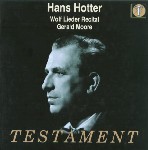By definition, vintage Hotter in Wolf songs is self-recommending. Testament has gathered some of the great bass-baritone’s finest recordings made in his prime between 1951 and 1957, sensitively accompanied by Gerald Moore. Hotter had a remarkable ability to color his voice to subtly highlight words and phrases without the hectoring and underlining that typified the lieder singing of Fischer-Dieskau and his disciples. His dark voice lends gravity to heavier fare such as the Harfenspieler Lieder, but it’s no impediment to capturing the many-voiced humor of songs like “Geselle, woll’n wir uns in Kutten hüllen” from the Italienische Liederbuch. The dynamic range and marriage of words with music in the two Coptisches Lied from the Goethe-Lieder are perfection itself, and Hotter’s intensity carries the cosmic matters of “Grenzen der Menschheit” along on waves of generous tone. In longer songs such as “Prometheus” his huge range of tone-colors and dynamics keeps you pinned to your seat. The disc contains two versions of “Anakreon’s Grab”, from 1951 and 1957, the earlier taken at a more flowing tempo, the latter, slower but as effective in its resigned gloom. If you’re only having one Wolf CD, let this one be it. [3/20/2001]
































